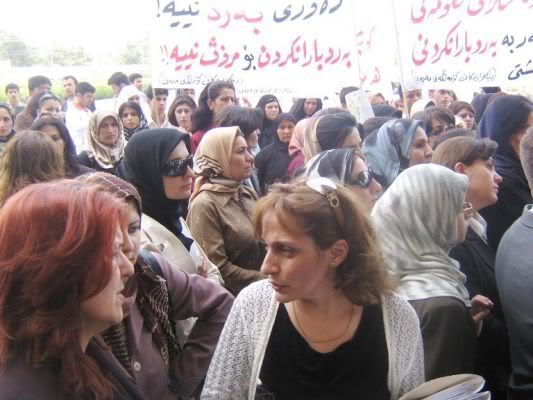
-May
2007 Demonstration Against Honor Killing, Kurdistan, Iraq-
- by Lys Anzia / WNN - Women News Network
American social critic, Katha Pollit, is speaking out about the recent horrendous crime against a young 17 year old woman in Iraq in the coming, May 28, issue of “The Nation” magazine. The young woman was stoned to death.
Why? For loving the wrong guy.
Du’a Khalil Aswad, a 17-year-old member of the Kurdish Yazidi sect, a non-muslim sect in Bashika, just outside Iraq’s northern city of Mosul, fell in love with the enemy – a boy from the Sunni faith. Unbelievably, as police watched, Du’a was killed mercilessly. A video film that was made by witnesses to the crime has been broadcast widely throughout the internet over the past week.
The killing was part of what is known as an “honor killing.” The United Nations affiliate, Human Rights Watch, defines honor killing as, “Acts of violence, usually murder, committed by male family members against female family members, who are perceived to have brought dishonor upon the family. A woman can be targeted by (individuals within) her family for a variety of reasons, including: refusing to enter into an arranged marriage, being the victim of a sexual assault, seeking a divorce — even from an abusive husband — or (allegedly) committing adultery. The mere perception that a woman has behaved in a specific way to “dishonor” her family, is sufficient to trigger an attack.”
In searing justification families of the victims of honor killings, almost exclusively women, carry out these deadly deeds. The murderer is usually a father, brother or uncle but sometimes can be male friends of the family. In countries where honor killings occur today the police and court systems are known to be complacent in protecting women who are in danger of being killed.
The crimes are often pre-meditated and usually occur among rural families that are uneducated and poor. In dealing with their reputation within their own society these families have placed their own women’s lives on the auction block in an attempt to gain approval and standing in their local communities.
Some honor killings, called “honor suicides” occur by the woman’s own hand when emotional pressure by the family on the woman seems to be insurmountable to a young woman who desperately hopes to gain approval from those she loves. Excruciatingly low self-esteem among these women leads to these suicides. In some instances what appears to be an “honor suicide” is actually an orchestrated honor killing perpetuated by the family.
Honor killings today do happen in countless countries. According to the International Campaign Against Honour Killings, 52 separate nations, which also include the developed countries of Holland, Germany, Sweden, the UK and the U.S., are all locations that have had or are still having honor killings today.
The suspicion of honor killings has not always been the exclusive domain of rural-only uneducated families. The 1977 execution of Saudi Arabia’s, Princess Misha’al bint Fahd al Saud, has been under a 30 year cloud of suspicion. It is believed in some corners that the order for the death of the 19 yr. old princess, due to her insistence in marrying someone not approved of by the family, was carried out by her great uncle.
UN Special Rapporteur on Women and Violence, Yakin Erturk, has traveled to many world locations to report on violence against women. In a statement to the Turkish Daily News she said, “Honor killings seem to be excused by the words ‘culture’ and ‘tradition,’ but nothing should sit above justice and law if a country is to be considered contemporary or ‘developed.’ The honor killings in Europe are a problem as well.”
In Kurdistan on May 1, 2007, women from many regions in Iraq protested the indiscriminate and often under reported Iraq honor killings.
“We have been working on the killings for a long time, all of us, all of the women’s organizations,” says Chilura Hardi, director of the women’s center and international NGO - Khatuzeen Center for Social Action, in Irbil, Iraq. “We have been writing articles in the papers, in magazines,” she added. “It just does not seem to go anywhere. When this (recent killing in Bashika) happened I think it woke us all up to realizing, look, if we do not do something this is going to continue and it’s going to get worse.”